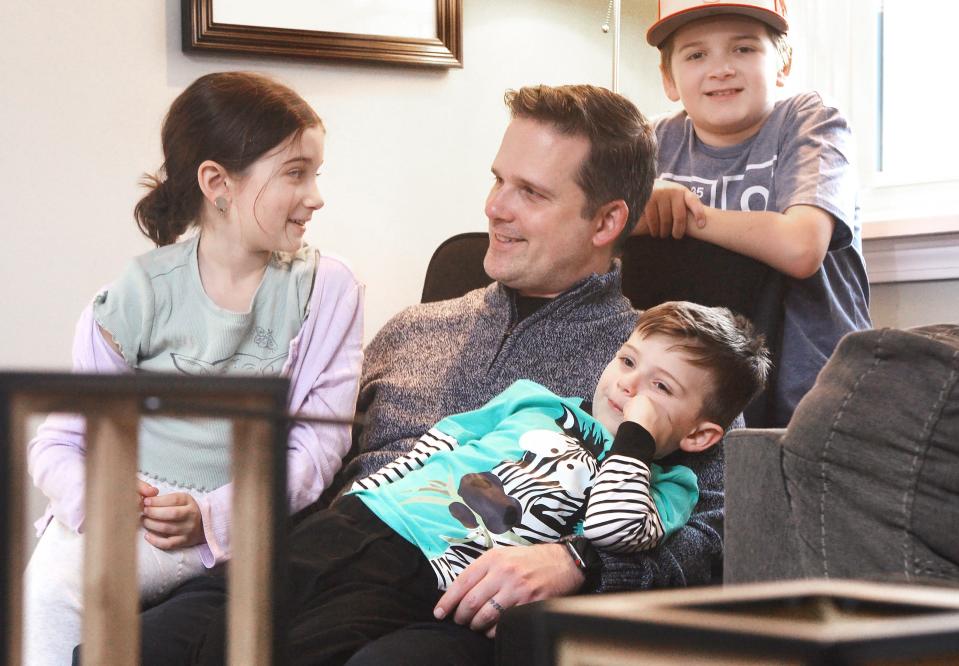Jay Breneman's battle with long COVID: 'Life is just on a major pause right now'
- Oops!Something went wrong.Please try again later.
Jay Breneman felt strong enough in July to pedal 30 miles along the Erie Canal with his son, Elijah, during a summer vacation trip.
Six months and one bout of COVID-19 later, Breneman doesn't have the energy or stamina to balance himself on a bicycle, let alone ride one. Simply standing up can cause the Erie man's heart to race from about 90 beats a minute to 130 or more.

"My biggest fear is that my family would find me dead from a heart attack," said Breneman, 40, who is married with three children: Elijah, 11, Paige, 8, and Milo, 4.
Breneman suffers from long COVID, a range of ongoing health problems that affect a disturbingly high percentage of the people infected with the COVID-19 virus. Up to 40% of those who get COVID-19 still report symptoms three months later, according to the Centers for Disease Control & Prevention.
Recovering from COVID: 20 months later: Erie-area doctor returns to work after COVID-19, double-lung transplant
Many questions remain about why some people get long COVID and how it should be treated, but physicians know more about the illness than they did when they first saw patients in late 2020, said Dr. Jeffrey McGovern, an Erie pulmonologist who oversees the northern tier of Allegheny Health Network's Post-COVID-19 Recovery Clinic.
Long COVID patients tend to suffer symptoms like shortness of breath, fatigue and "brain fog," but a small number of them report more unusual health issues.
"One is Blue Toe Syndrome, where a neuropathic or vascular issue causes the toe to change color," McGovern said. "I have also had some long COVID patients start to act out during their dreams."
Breneman's long COVID issues have been more common, though debilitating. The PennWest Edinboro instructor, Erie School Board member and former Erie County Council member figured he contracted COVID-19 in August, shortly after a family member tested positive.
His initial symptoms included chills, fever and a headache.
"My symptoms weren't that severe," Breneman said. "I didn't feel sick enough at first to go to the hospital or see the doctor."
Long COVID: 'I haven't felt whole for a year': Erie County residents deal with long-haul COVID-19
Instead of feeling better after several days, Breneman developed a cough and shortness of breath. He also continued to test positive for COVID-19 nine days after his initial positive test.
He contacted his health-care provider at Erie Veterans Affairs Medical Center and scheduled an appointment for the next day.
"They ordered tests and prescribed me an inhaler, steroids, antibiotics, ibuprofen and an antihistamine," Breneman said. "It helped me, though the steroids gave me a false sense of strength. I'd write an email or attend a virtual meeting, and immediately have a headache, tunnel vision or blurred vision, and have to lie down."
More: As COVID turns 3, experts worry where the next pandemic will come from – and if we'll be ready
Most long COVID patients were healthy before infection
Like many long COVID patients, Breneman was healthy before his infection and had mild to moderate initial symptoms.
Doctors don't know why relatively few long COVID patients are older or have more severe symptoms during COVID's acute phase, McGovern said.

"Long COVID affects people who aren't as sick initially. That has been a consistent aspect since the beginning," McGovern said. "We're not sure why. Remember, we have only been able to study this since 2020."
Though the World Health Organization defines long COVID as the continuation or development of symptoms three months after initial diagnosis, some patients have been battling long COVID far longer.
Long-term effects : CDC reports 3,500 deaths from long COVID. That's only 'scratching the surface,' experts say.
"I have patients who got sick in November 2020 and who are still dealing with symptoms," said Dr. Danielle Hansen, a LECOM Health geriatrician and vice president of acute care, behavioral health and quality at Millcreek Community Hospital. "There is so much still unknown and unpredictable about this disease."
Doctors are still trying to determine who among those infected with COVID-19 is more likely to get long COVID.
Risk factors include not being up to date with COVID-19 vaccinations, having an underlying health condition before getting infected, and devloping multisystem inflammatory syndrome during infection, the CDC reported.
Breneman said he received his primary COVID-19 vaccines and the first booster shot, and was scheduled to get the bivalent booster in August when he became sick. He received the booster later in the fall.
Asked about any pre-existing conditions that might have increased his chances of getting long COVID, Breneman said his lungs were exposed to the smoke from burn pits, open-air burning of waste outside military sites, during his tour of duty with the Army in the Middle East during the Iraq War.
"But I received chest scans since then and my lungs were clear before COVID," Breneman said.

That is not the case now. A recent CT scan of his lungs showed minor scarring and a partially collapsed lung, Breneman said.
Those are likely the main causes for at least some of his long COVID symptoms, but Breneman is not sure. Erie VAMC officials declined to make Breneman's health-care provider available to discuss his case.
"I do know that the way my lung is collapsed, they can't just inflate it," Breneman said. "And we don't know if the scarring will heal over time."
Time, and supportive care, remain the most effective ways to treat long COVID, McGovern said. That means plenty of rest, inhalers to improve breathing and other medications to reduce symptoms.
Taking Paxlovid, the antiviral medicine that lessens COVID-19 symptoms, and reduces the chances of complications and hospitalizations, can reduce the likelihood of long COVID, McGovern said.
But Paxlovid must be started within five days of the onset of symptoms to be effective.
"By the time I saw my provider, it was too late to start Paxlovid," Breneman said.
More: Coughing, congestion and sore throats: Do Erie residents have COVID-19, RSV or the flu?
Long COVID cases appear to be declining, at least in Erie region
The good news is it appears the omicron subvariants cause a lower percentage of long COVID cases, though doctors again aren't sure why.
"Overall, we are seeing fewer cases and less dramatic cases of long COVID in our clinic, though I don't know where it stands nationally," McGovern said.
Two years of COVID-19:How Erie has dealt with the pandemic
"Omicron seems a little less than half as likely to cause longer symptoms as the delta variant did," said Dr. Howard Nadworny, a Saint Vincent infectious diseases specialist and Erie County Department of Health adviser. "The ones who get long COVID, it's not as severe with the brain fog and lung issues. But omicron has only been around for about (12) months, so we will see."
Breneman said his condition is improving, slowly. He can string together a few errands at a time before he must head home to rest for a day or so.
Climbing stairs remains a challenge and the man who once performed 20-mile marches in the Army now at times uses a walker or a wheelchair. He steps gingerly as he walks, as if he is nursing a back injury.

Breneman longs to resume the active lifestyle he led before COVID, but he knows the key is to not exert himself too much. Almost all of his meetings are done remotely, even those he attends as a member of the Erie School Board.
He is scheduled in January to begin pulmonary therapy at Erie VAMC in an effort to increase his lung capacity and stamina. The short-term goal is to improve enough to attend upcoming events like his daughter's dance and his son's basketball games.
"The one thing is that I have never asked, 'Why me?'" Breneman said. "I guess it's more about what's next. It's been hard to stop doing so many things. ... Life is just on a major pause right now."
Contact David Bruce at dbruce@timesnews.com. Follow him on Twitter @ETNBruce.
This article originally appeared on Erie Times-News: Erie School Board member Jay Breneman fights long COVID

